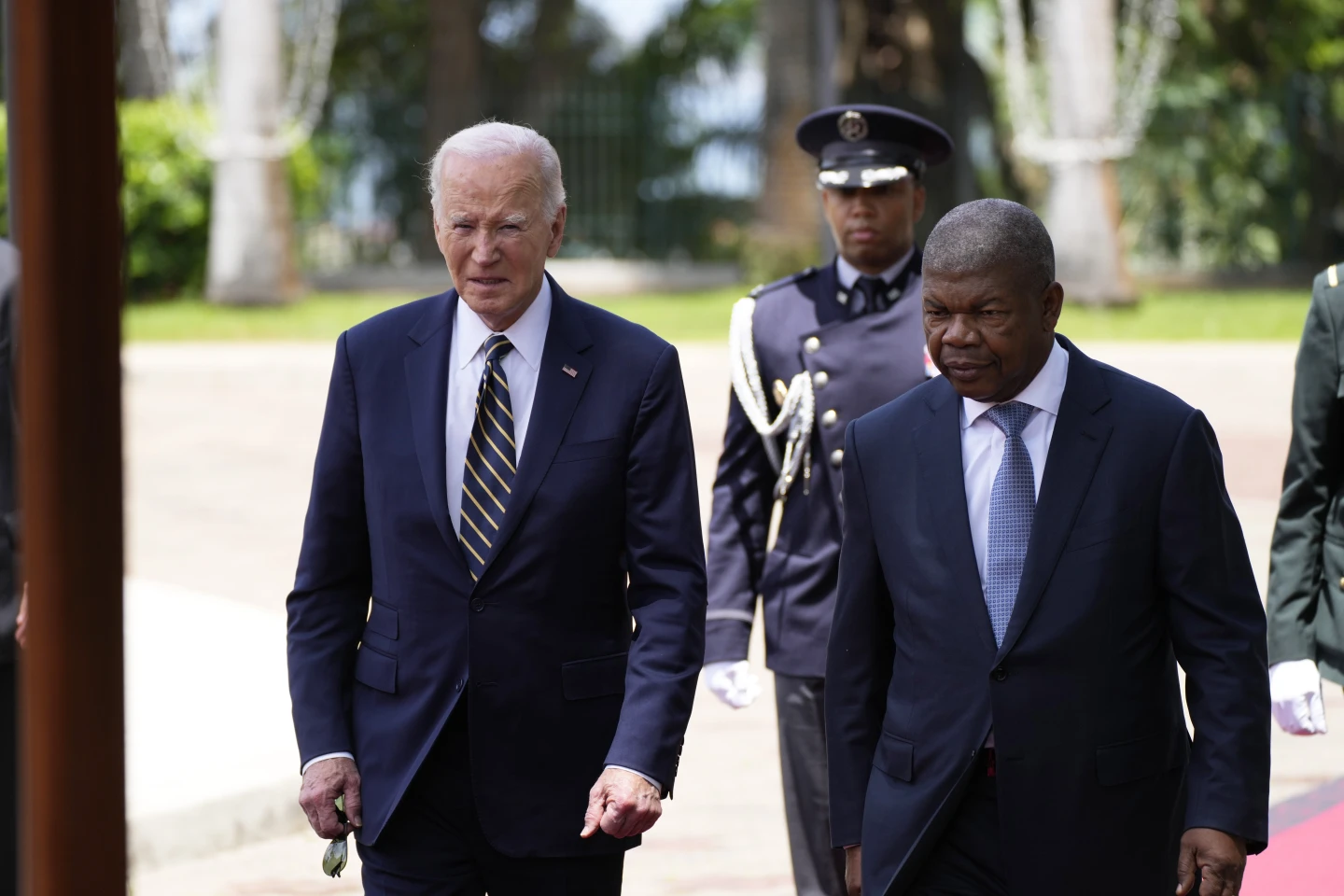- World & Africa
- No Comment
Biden says the US is ‘all in’ on Africa during his Angola visit meant to counter China

LUANDA: Speaking of “our nation’s original sin,” President Joe Biden on Tuesday toured a slavery museum in Angola and inspected shackles and a whip but also addressed Africa’s future, saying Africans will make up one in four people by 2050 and the world’s fate rests in their hands.
Biden’s visit, the first to Angola by a U.S. president, is meant to promote billions of dollars of commitments to the sub-Saharan African nation for what he called the largest ever U.S. rail investment overseas.
“The United States is all in on Africa,” Biden earlier Tuesday told Angolan President João Lourenço, who called Biden’s visit a key turning point in U.S.-Angola relations dating back to the Cold War.
But even as the trip was meant to counter China’s influence on the African continent of over 1.4 billion people by showcasing a U.S. commitment of $3 billion for the Lobito Corridor railway redevelopment linking Zambia, Congo and Angola, China announced its own move.
The corridor across southern Africa is meant to make it easier to ship raw materials for export and advance the U.S. presence in a region rich in critical minerals used in batteries for electric vehicles, electronic devices and clean energy technologies.
China already has heavy investments in mining and processing African minerals, and on Tuesday it announced it is banning exports to the United States of gallium, germanium, antimony and other high-tech materials. It came a day after the U.S. expanded its list of Chinese technology companies subject to controls.
Biden will visit the coastal city of Lobito on Wednesday for a look at the corridor’s Atlantic Ocean outlet. The project also has drawn financing from the European Union, the Group of Seven leading industrialized nations, a Western-led private consortium and African banks.
It was not clear how much of the U.S. commitments had been delivered and how much will depend on the Trump administration.
White House national security spokesperson John Kirby said the corridor’s completion is “going to take years.” That means much of it may fall to Donald Trump, who takes office on Jan. 20.
Asked whether the project could proceed without Trump’s support, Kirby said the Biden administration’s hopes “that they see the value too.”
Kirby also insisted that the corridor was about more than simply trying to outpace Beijing, saying that “we’re not asking countries to choose between us and Russia and China.”
One Angolan, 19-year-old Ladislau Ngola, called Biden’s visit “very important for our country as the Lobito Corridor will create lots of jobs for young people.” Julião Oliveira said “Africa in general” would benefit, too.
The rainy streets of the capital, Luanda, had a heavy military presence but few civilians — a striking change from Biden’s arrival on Monday, when cheering onlookers lined his route. Authorities on Tuesday encouraged people downtown to stay home. As the motorcade passed through outer neighbourhoods, crowds waved from rooftops or intersections.
Biden and Lourenco briefly addressed reporters before a closed-door meeting. Biden ignored questions about his decision to issue a pardon for his son after previously pledging not to, and joked to the Angolan delegation, “Welcome to America.”
He also told Lourenco while pledging to use the trip to listen: “We don’t think, because we’re bigger and more powerful, that we’re smarter. We don’t think we have all the answers.”
Angola’s president said he’d like to see a public-private partnership to increase energy production, and praised Biden’s leadership on the Lobito Corridor, saying it would “always be remembered.”
After the meeting, a senior U.S. administration official said China didn’t come up. The official, who insisted on anonymity to discuss a meeting that was not public, also said Biden’s visit to Lobito will be joined by the presidents of Zambia and Congo.
Biden had promised to visit sub-Saharan Africa last year, after reviving the U.S.-Africa Summit in 2022. But the trip was delayed until this year, reinforcing a sentiment among Africans that their continent is still a low priority for Washington. The last U.S. president to visit sub-Saharan Africa was Barack Obama in 2015.
Biden toured Angola’s National Slavery Museum at a site that was formerly the headquarters of the Capela da Casa Grande, a 17th century temple where slaves were baptized before boarding ships to America. Angola was the departure point for an estimated 6 million enslaved people, the White House said.
Looking ahead, “I know the future runs through Angola, through Africa,” Biden said.
Speaking on a stage by the water, he said history “cannot and should not be erased,” and that while America was founded on the ideal of freedom and equality, “it’s abundantly clear today we have not lived up to that ideal.”
